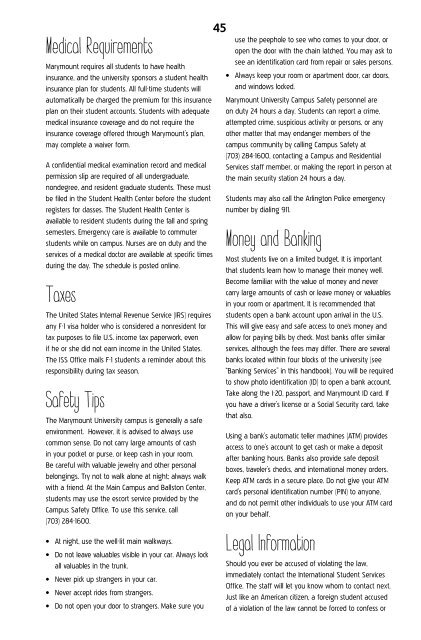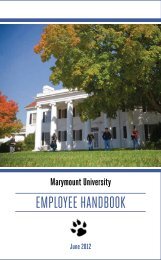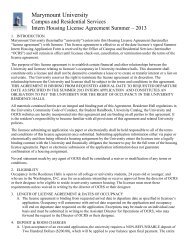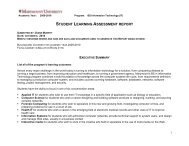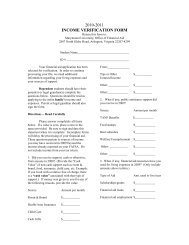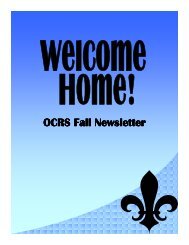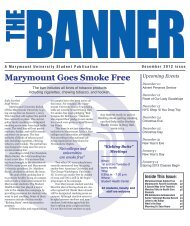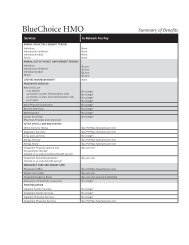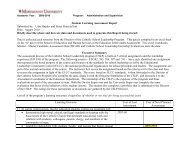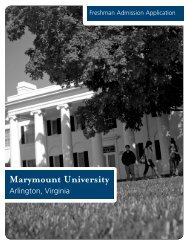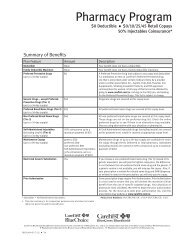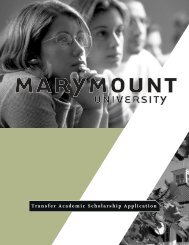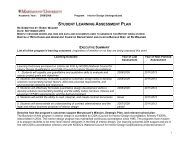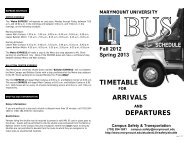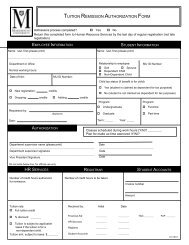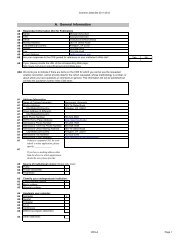Student Handbook - Marymount University
Student Handbook - Marymount University
Student Handbook - Marymount University
You also want an ePaper? Increase the reach of your titles
YUMPU automatically turns print PDFs into web optimized ePapers that Google loves.
Medical Requirements<br />
<strong>Marymount</strong> requires all students to have health<br />
insurance, and the university sponsors a student health<br />
insurance plan for students. All full-time students will<br />
automatically be charged the premium for this insurance<br />
plan on their student accounts. <strong>Student</strong>s with adequate<br />
medical insurance coverage and do not require the<br />
insurance coverage offered through <strong>Marymount</strong>’s plan,<br />
may complete a waiver form.<br />
A confidential medical examination record and medical<br />
permission slip are required of all undergraduate,<br />
nondegree, and resident graduate students. These must<br />
be filed in the <strong>Student</strong> Health Center before the student<br />
registers for classes. The <strong>Student</strong> Health Center is<br />
available to resident students during the fall and spring<br />
semesters. Emergency care is available to commuter<br />
students while on campus. Nurses are on duty and the<br />
services of a medical doctor are available at specific times<br />
during the day. The schedule is posted online.<br />
Taxes<br />
The United States Internal Revenue Service (IRS) requires<br />
any F-1 visa holder who is considered a nonresident for<br />
tax purposes to file U.S. income tax paperwork, even<br />
if he or she did not earn income in the United States.<br />
The ISS Office mails F-1 students a reminder about this<br />
responsibility during tax season.<br />
Safety Tips<br />
The <strong>Marymount</strong> <strong>University</strong> campus is generally a safe<br />
environment. However, it is advised to always use<br />
common sense. Do not carry large amounts of cash<br />
in your pocket or purse, or keep cash in your room.<br />
Be careful with valuable jewelry and other personal<br />
belongings. Try not to walk alone at night; always walk<br />
with a friend. At the Main Campus and Ballston Center,<br />
students may use the escort service provided by the<br />
Campus Safety Office. To use this service, call<br />
(703) 284-1600.<br />
• At night, use the well-lit main walkways.<br />
• Do not leave valuables visible in your car. Always lock<br />
all valuables in the trunk.<br />
• Never pick up strangers in your car.<br />
• Never accept rides from strangers.<br />
• Do not open your door to strangers. Make sure you<br />
45<br />
use the peephole to see who comes to your door, or<br />
open the door with the chain latched. You may ask to<br />
see an identification card from repair or sales persons.<br />
• Always keep your room or apartment door, car doors,<br />
and windows locked.<br />
<strong>Marymount</strong> <strong>University</strong> Campus Safety personnel are<br />
on duty 24 hours a day. <strong>Student</strong>s can report a crime,<br />
attempted crime, suspicious activity or persons, or any<br />
other matter that may endanger members of the<br />
campus community by calling Campus Safety at<br />
(703) 284-1600, contacting a Campus and Residential<br />
Services staff member, or making the report in person at<br />
the main security station 24 hours a day.<br />
<strong>Student</strong>s may also call the Arlington Police emergency<br />
number by dialing 911.<br />
Money and Banking<br />
Most students live on a limited budget. It is important<br />
that students learn how to manage their money well.<br />
Become familiar with the value of money and never<br />
carry large amounts of cash or leave money or valuables<br />
in your room or apartment. It is recommended that<br />
students open a bank account upon arrival in the U.S.<br />
This will give easy and safe access to one's money and<br />
allow for paying bills by check. Most banks offer similar<br />
services, although the fees may differ. There are several<br />
banks located within four blocks of the university (see<br />
“Banking Services” in this handbook). You will be required<br />
to show photo identification (ID) to open a bank account.<br />
Take along the I-20, passport, and <strong>Marymount</strong> ID card. If<br />
you have a driver’s license or a Social Security card, take<br />
that also.<br />
Using a bank’s automatic teller machines (ATM) provides<br />
access to one’s account to get cash or make a deposit<br />
after banking hours. Banks also provide safe deposit<br />
boxes, traveler’s checks, and international money orders.<br />
Keep ATM cards in a secure place. Do not give your ATM<br />
card’s personal identification number (PIN) to anyone,<br />
and do not permit other individuals to use your ATM card<br />
on your behalf.<br />
Legal Information<br />
Should you ever be accused of violating the law,<br />
immediately contact the International <strong>Student</strong> Services<br />
Office. The staff will let you know whom to contact next.<br />
Just like an American citizen, a foreign student accused<br />
of a violation of the law cannot be forced to confess or


